Vatican initiative challenges providers to take on big system change
By JULIE MINDA
A new Vatican initiative is calling on the global Catholic Church, including Catholic health care, to ground its environmental work in integral ecology. This concept recognizes the interrelatedness of various ecologies or relationships — natural,
social, economic and cultural — and captures how the global ecological crisis is a result of these relationships falling out of balance.
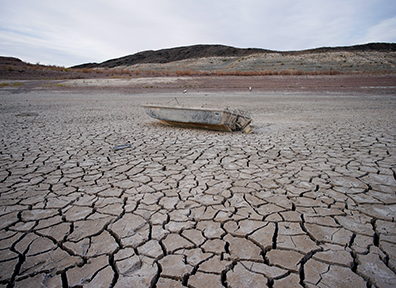
A megadrought in the Western U.S. has dropped water levels in Nevada's Lake Mead to historic low levels. The integral ecology philosophy driving much environmental work in the Catholic Church today posits that the climate disaster is part of a global
ecological catastrophe that is connected not only to a loss of biodiversity but also to human crises such as extreme poverty and mass migration.
John Locher/Associated Press
CHA is taking part in and endorsing the initiative, which is called the Laudato Sí Action Platform. Catholic health systems that have signed on include Ascension, Providence St. Joseph Health and CommonSpirit Health. Concern about the devastating
health impacts of pollution and climate change, particularly on the poor and vulnerable, has been a major driver in Catholic health care's environmental efforts.
The Vatican sees the initiative as a way to raise awareness and understanding of integral ecology and to provide the framework to help participants to operationalize the concept.
This way their environmental work could be more deeply integrated with other priority social justice and mission work as well as business practices and advocacy efforts.

Richter
Laura Richter, system vice president of formation and spirituality at the 23-hospital SSM Health system, says the integral ecology approach recognizes "that we as humans are intimately united with all that exists. We are intimately connected with our
community, and we are to be responsible stewards and responsible citizens. We are to have the global perspective that what we do affects all.
"It is about interconnectedness," she says.
One world
The concept of integral ecology appears in Pope Francis' 2015 encyclical on the environment,
Laudato Sí … On Care for Our Common Home. Indu Spugnardi, CHA director of advocacy and resource development, explains that drought, floods, war, famine, pollution, diseases related to health inequity and even
human trafficking are not separate crises.
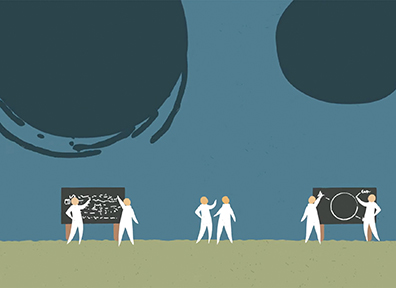
This image from an animated video explaining integral ecology illustrates people futilely attempting to engineer the way out of ecological crises through technological fixes. To treat the root causes of the unfolding ecological catastrophe will require
"a new way of seeing, thinking and acting," according to the video from Eco-Catholic, which makes resources to explain Catholic teachings on ecology.
eco-catholic.com
Spugnardi points to Pope Francis' discussion in Laudato Sí of how the roots of environmental and social degradation are knotted and cannot be addressed in isolation. He writes, "Given the scale of change, it is no longer possible
to find a specific, discrete answer for each part of the problem. It is essential to seek comprehensive solutions which consider the interactions within natural systems themselves and with social systems. We are faced not with two separate crises,
one environmental and the other social, but rather with one complex crisis which is both social and environmental."
And, according to the conceptual framework, many of these plagues are rooted in disconnectedness from natural and social relationships. This can have the effect of allowing individuals and societies to ignore the exploitation of people and of the Earth.
Spugnardi adds that the Vatican's Dicastery for Promoting Integral Human Development launched the Laudato Sí Action Platform last year to unite the Catholic Church and others around the world in responding to ecological threats and social injustice
— "the cry of the Earth" and "the cry of the poor" — in a unified way. The aim is to engage people and organizations in seeking societal change and gain the critical mass to make an impact on a global scale.
Organizations, families and individuals signing on to the action platform develop plans to combat environmental degradation, discrimination and race-based or status-based injustices and annually share progress on how they are enacting their plans and
what impact they are having. They also are to encourage others to participate in the Laudato Sí Action Platform.
CHA is a signatory and is sharing its environmentalism resources with the Vatican for use by participants. The association also is assisting the Vatican in developing new resources for the initiative.
CHA provided input on the self-assessment and reflection process for health care providers taking part in the action platform. The association is advising ministry systems and facilities on how to participate in the Laudato Sí Action Platform.
Resources including suggested actions are available at laudatosiactionplatform.org and laudatosiweek.org.
Upstream
Sr. Mary Ellen Leciejewski, OP, is system vice president of environmental sustainability for the 140-hospital CommonSpirit Health. She says Catholic health care and its founding congregations long have prioritized environmentalism
and social justice, and in recent years many in the ministry have formally approached those areas in a manner that recognizes the causal links between environmental degradation, disease and health inequity. People of color with low incomes are most
likely to live in areas where the air, ground and water contain toxins.
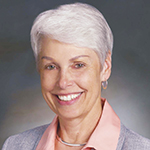
Leciejewski
Increasingly, through work to address social determinants of health, Catholic health care systems in the U.S. are trying to improve the health status of populations. For instance, they are promoting safe housing and they are advocating for environmental
justice.
All around the world, people living in poverty suffer the most from environmental disasters including climate change.
Sr. Leciejewski says integral ecology is tied into an eco-spirituality that posits that as the Earth cares for humanity, so should humanity care for the Earth. Doing so will get at the forces that are further harming vulnerable people, she says.
She says engaging in the Vatican's action platform is challenging CommonSpirit to critically assess its extensive work around environmentalism and social justice to determine what more it can do in these areas.
Environmental justice
Elizabeth Schenk is executive director of environmental stewardship at Providence St. Joseph Health. Well before the 52-hospital system signed on to the action platform, it had made environmental and social
justice top advocacy priorities at the local, state and federal levels, Schenk notes.
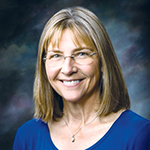
Schenk
Providence has made strides in reducing its environmental impact and in its pursuit of social justice aims, she says. She adds that pollution reduction efforts on a national scale will require collective will, public policy changes and large-scale investments.
For example, a wholesale move to reduce the proportion of carbon-based energy in the nation's energy grid is an accomplishment that would make it possible for hospitals and other industries to achieve sweeping reductions in their carbon footprints.
However, this would require more government programs supporting clean energy sources.
Schenk says that having a new worldwide movement propelled by the Vatican will normalize integral ecology, and inspire more people — including those in positions of power — to take meaningful, impactful action.
Every department, every individual
Lou Fierens, executive vice president of administrative services at Trinity Health, says that 88-hospital system is pursuing many of the goals set forth by the Vatican.
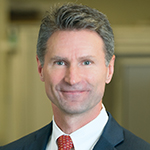
Fierens
Fierens says that Trinity Health prioritizes environmental preservation in decision-making in every department including supply chain, operations, community health and well-being, mission, communications and finance.
Schenk adds that since 2020, all leaders at Providence have had ecological goals that they must meet and document as part of their formal responsibilities. "We needed that level of accountability," explains Schenk.
Sr. Leciejewski describes how environmental accountability plays out at CommonSpirit by giving an example of a supply chain manager who, in addition to evaluating quality, price, availability and suitability of products also has to weigh the environmental
impact of production methods and product disposal. The manager also would consider whether the goods were manufactured using forced labor.
Richter says at SSM Health, environmentalism and the pursuit of social justice are so ingrained in the culture that the system asks employees to determine what they personally can do to advance the common good. Her family raises hens for their eggs; they
compost and garden; and Richter drives a hybrid vehicle. She notes that she's seen SSM Health President and Chief Executive Laura Kaiser joining employee trash pickup crews along roadsides; and Kaiser encourages staff to host multiple recycle drives
— and she is a big contributor to the drives.
"We all have to work together, we all have to be proactive," Richter says. "It's about promoting a sense of community, writ large."
Click here to view a video on integral ecology.
Further reading: